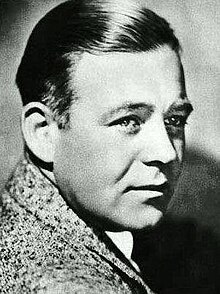Robert Ames (actor)
| Robert Downing Ames | |
|---|---|
 |
|
| Born |
Robert Downing Ames March 23, 1889 Hartford, Connecticut, U.S. |
| Died | November 27, 1931 (aged 42) New York City, U.S. |
| Cause of death | delirium tremens |
| Occupation | Actor |
| Years active | 1920–1931 |
| Spouse(s) | Alice Gerry (m. 1907 - 19??) Frances Goodrich (m. 1917–1923) Vivienne Segal (m. 1923–1926) Muriel Oakes (m. 1927–1930) |
Robert Downing Ames (March 23, 1889 – November 27, 1931) was an American stage and film actor whose career was cut short by his death at age 42.
Robert Ames was born in Hartford, Connecticut, where his father, Louis Mason Ames, was employed as an accountant for an insurance company and his mother, Mary Elma (née Downing) Ames, worked as a voice coach.
Ames's first big acting break came when a friend brought him to the attention of the actor Henry Miller, which led to a role in Miller's production of The Great Divide by William Vaughn Moody. Ames would spend eleven seasons with Miller's company before moving on to Jessie Bonstelle's stock company for eight seasons and the Municipal Stock Company for three. His first Broadway success came in 1916 playing Charles Daingerfield (alias Brindlebury) opposite Ruth Chatterton in Come Out of the Kitchen by A.E. Thomas. Ames played leading roles in The Hero (1921) by Gilbert Emery,Lights Out (1922) by Paul Dickey and Mann Page,Icebound (1923) by Owen Davis, We've Got to Have Money (1923) by Edward Laska, and The Desert Flower (1924) by Don Mullally.
After a brief stint in vaudeville, Ames moved to Hollywood in the mid 1920s to concentrate on film work, though on occasion he would return to perform on the New York stage. He co-starred in several early talkies, including The Trespasser (1929) with Gloria Swanson, A Lady to Love (1930) with Vilma Bánky and Edward G. Robinson, and the 1930 version of Holiday, opposite Ann Harding in the role later taken by Cary Grant in the better-remembered 1938 remake.
...
Wikipedia
